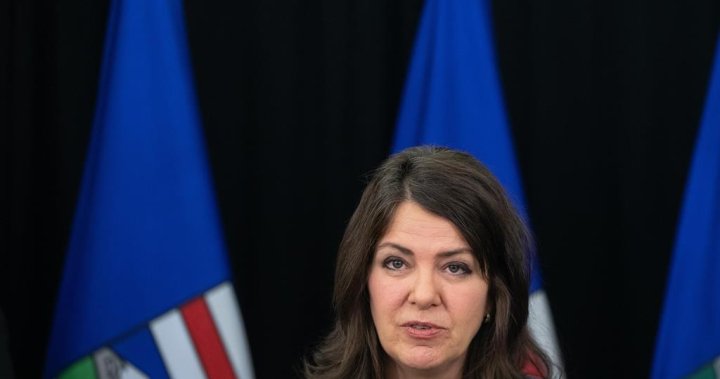Alberta Premier Danielle Smith will be using the province’s Sovereignty Act to challenge Ottawa’s requirement to achieve a net-zero electricity grid by 2035.
Smith confirmed the plan on 630 CHED’s and QR Calgary’s Your Province Your Premier on Saturday.
During the radio show, Smith said the province tried to work collaboratively with the federal government to make the province’s electricity grid net zero by 2050. However, Ottawa’s target of 2035 is “unachievable” and will make electricity unaffordable for Albertans, she said.
“We will not put our operators at risk of going to jail if they do not achieve the unachievable,” she said. “We have to have an affordable grid, and we’re going to make sure that we defend our constitutional jurisdiction to do that.”
Smith added that the Clean Energy Regulations disregard Section 92 of the Constitution Act, which says provincial matters fall under provincial jurisdiction.
“I don’t want to do this. I really didn’t. From the very first conversation I had with (Prime Minister) Justin Trudeau, I said I wanted to work with him on this. We put together a table with good negotiators so that we could find areas of common ground. But Steven Guilbeault (federal environment minister) … he’s a maverick. He doesn’t seem to care about the law, doesn’t care about the Constitution. I do. And we’re going to make sure that we assert that,” she said.
This comes after the Alberta government sent an 18-page technical submission to Ottawa earlier this month explaining why the national Clean Energy Regulations “are simply unworkable.”
Global News has reached out to Steven Guilbeault’s office with a request for comment.

In a letter attached to the Alberta submission to the federal government, Environment Minister Rebecca Shulz wrote: “In Alberta, your regulations will increase power bills, lead to job losses, compromise the grid, and impose health and safety risks when blackouts occur. The federal electricity regulations are simply unworkable and I encourage you to scrap them entirely, before it is too late.”
The purpose of the regulations is threefold, according to Guilbeault. It is designed to increase Canada’s economic competitiveness, transition the energy economy to renewables and fight climate change.
Alberta isn’t the only province saying the federal government’s net zero goal is unachievable.
In August, Saskatchewan Premier Scott Moe called Ottawa’s Clean Energy Regulations unachievable and unaffordable, saying they would hit residents with higher costs of living.
Saskatchewan also set its own net-zero goals for 2050 in May.

Martin Olzynski, an associate professor for the University of Calgary’s law faculty, said he is not surprised that Smith is planning to invoke the Sovereignty Act on Monday.
However, Olzynski said the action won’t work because there are only two ways to challenge laws in Canada: through the courts or through federal elections.
“This is down to the effort in what they believe is constitutional,” Olzynski told Global News. “There’s no magical third way or backdoor for provinces to pick and choose which federal laws apply in the province.”
Olzynski said invoking the Sovereignty Act is “political theatre,” because the Clean Energy Regulations may end up being challenged in court.
“At some point, it’s going to come to a head in the court … At the end of the day, if there are valid laws that were upheld, there’s nothing the provinces can do,” the associate professor said.
“If (the laws) are upheld by the courts, they apply to Saskatchewan and Alberta, and companies that don’t conform to their regulations will be out of compliance.
“The federal government has been pretty hands-off when it applies to (the Sovereignty Act). Maybe this will finally get them to think about it.”
— with files from Sarah Ryan
© 2023 Global News, a division of Corus Entertainment Inc.




